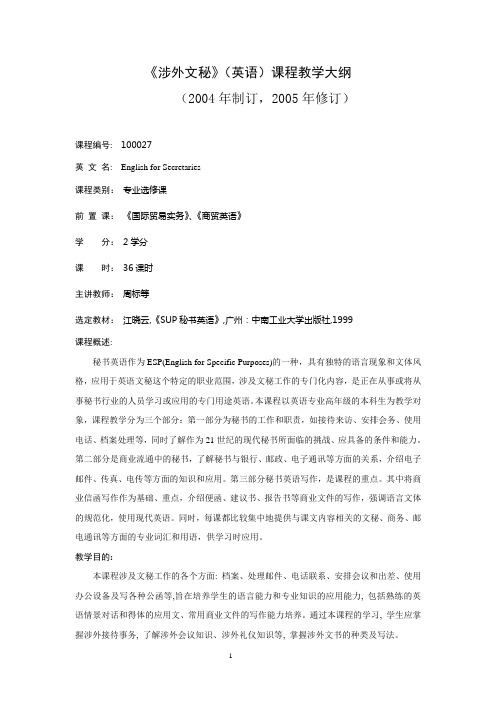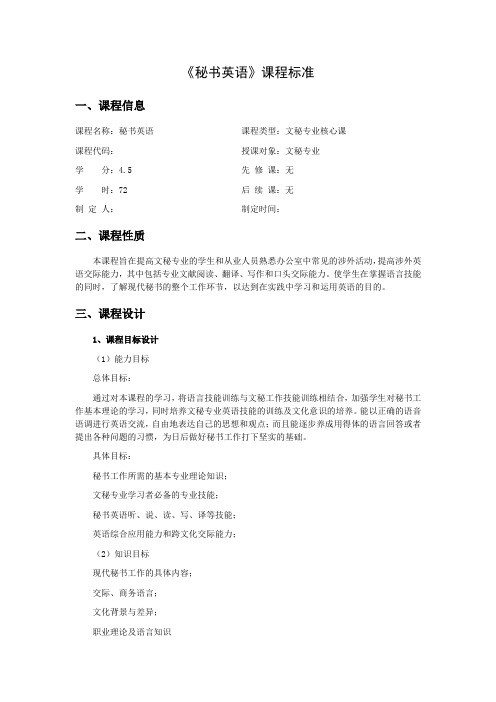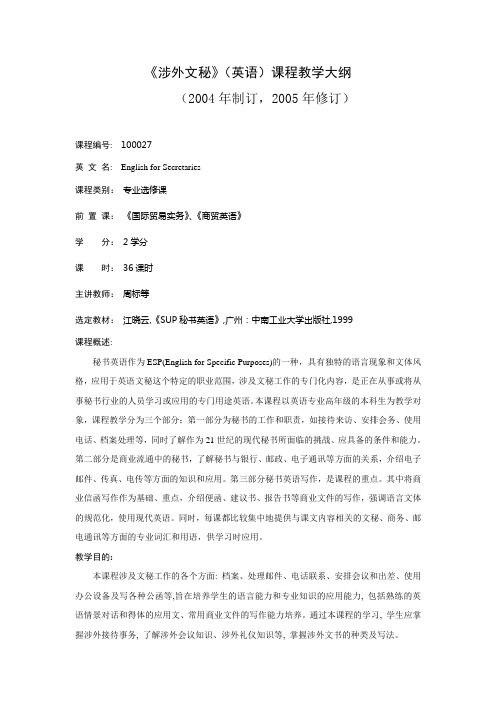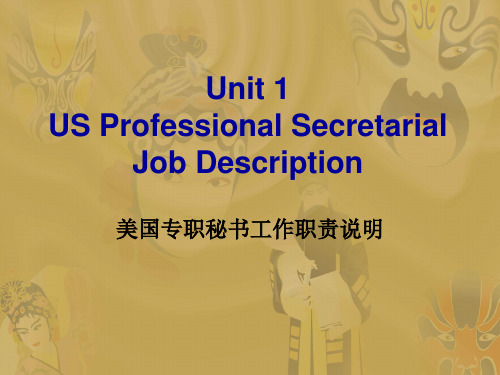文秘英语教学大纲7【精选资料】
《文秘英语》课程教学大纲

《涉外文秘》(英语)课程教学大纲(2004年制订,2005年修订)课程编号: 100027英文名: English for Secretaries课程类别:专业选修课前置课:《国际贸易实务》、《商贸英语》学分:2学分课时:36课时主讲教师:周标等选定教材:江晓云,《SUP秘书英语》,广州:中南工业大学出版社,1999课程概述:秘书英语作为ESP(English for Specific Purposes)的一种,具有独特的语言现象和文体风格,应用于英语文秘这个特定的职业范围,涉及文秘工作的专门化内容,是正在从事或将从事秘书行业的人员学习或应用的专门用途英语。
本课程以英语专业高年级的本科生为教学对象,课程教学分为三个部分:第一部分为秘书的工作和职责,如接待来访、安排会务、使用电话、档案处理等,同时了解作为21世纪的现代秘书所面临的挑战、应具备的条件和能力。
第二部分是商业流通中的秘书,了解秘书与银行、邮政、电子通讯等方面的关系,介绍电子邮件、传真、电传等方面的知识和应用。
第三部分秘书英语写作,是课程的重点。
其中将商业信函写作作为基础、重点,介绍便函、建议书、报告书等商业文件的写作,强调语言文体的规范化,使用现代英语。
同时,每课都比较集中地提供与课文内容相关的文秘、商务、邮电通讯等方面的专业词汇和用语,供学习时应用。
教学目的:本课程涉及文秘工作的各个方面: 档案、处理邮件、电话联系、安排会议和出差、使用办公设备及写各种公函等,旨在培养学生的语言能力和专业知识的应用能力, 包括熟练的英语情景对话和得体的应用文、常用商业文件的写作能力培养。
通过本课程的学习, 学生应掌握涉外接待事务, 了解涉外会议知识、涉外礼仪知识等, 掌握涉外文书的种类及写法。
教学方法:教学目的决定教学内容和教学手段,英语文秘人员特殊的工作性质决定了其所应具备多方面的知识和能力。
英语文秘人员应当是既懂专业同时又了解边缘学科知识,既通晓英,又懂得相关业务的复合型应用人才,秘书英语作为一门实用技能类课程,教学应紧紧抓住语言和应用这个关键。
文秘英语大纲

《文秘英语》课程教学大纲一、课程的性质和任务《文秘英语》为商务英语专业的一门专业必修课。
通过对本课程的学习,使学生能够掌握秘书工作中所需要掌握的基本技能,并能用流利的英语进行口头和笔头的对外交流和内部沟通,使学生成为具备双语综合能力的涉外秘书或文员。
二、课程的基本内容1、Students are required to know duties and skills of a secretary and to be familiarwith the resume; to master how to write and reply an application letter.2、Students are required to know proper office etiquette and how to receivevisitors; to master how to write letters of invitation.3、Students are required to know how to adapt various work styles of the boss; tomaster how to write a notice.4、Students are required to know something about marketing management andorganization; to grasp how to write a memo.5、Students are required to know something about communication and how tomake appointments; to grasp how to write welcome/farewell speech.6、Students are required to know employee training; to master office management.7、Students are required to know negotiation and agenda composition; to masterminutes of meeting.8、Students are required to know product planning and questionnaire of newproducts; to master how and how to write letters of reservation.9、Students are required to know Multinational Corporation and companyoverview; to master how to make a press release.10、Students are required to know post-sale service and how to make customerssatisfied; to grasp how to make proposals.三、课程的基本要求本课程要求学生具备一定的英语基本会话能力及商务英语基础知识。
文秘英语教学大纲

《秘书英语》教学大纲执笔人卢琳琅一、课程性质、地位和作用《秘书英语》是文秘专业学生的一门选修课程,是理论与实践相结合的课程。
通过该门课程的学习,学生可以全面掌握一定的英语语音知识、国际交往知识、涉外文秘日常业务等以及涉外文秘工作人员在不同涉外环节中的情景对话。
因此该门课程作为一门选修课程,在本专业课程体系中居于比较重要的地位。
二、课程教学对象、目的和要求本课程适用于大学专科层次文秘专业学生,该课程从培养高级应用型人才的总体目标出发,结合学生毕业后的工作实际,力求向学生提供其将来成为在英语环境中工作的办公室人员所需要的专业英语知识和技能,培养学生使用涉外业务英语的交际能力,其中包括专业文献阅读、翻译、写作和口头交际的能力,为学生在毕业后走上工作岗位上能成功地将所学的知识灵活应用到实际工作中做好充分地准备。
学习本课程,要求学生具备一定的秘书学方面的知识以及较好的英语水平,通过本课程的学习让学生对秘书英语语体风格有一定的了解,使学生掌握秘书(尤其是涉外秘书)所必须具备的基本知识和工作技能,提高专业英语的应用能力,为毕业后能在相关的工作岗位上成功地学以致用做准备。
学习本课程,主要采用课堂讲授和实践训练相结合的方法进行教学,让学生了解基本的涉外秘书需要的英语语言知识再结合课本内容所设计的情景进行教学,让学生能够在课堂学习加实践练习的模式下掌握和使用涉外秘书所需的基本知识和技能。
在实践课方面还要多设计书本外的如今现实中出现频繁的涉外秘书工作情景,让学生进行实践训练,能够全面掌握和灵活运用所学的秘书英语知识。
三、课程的相关课程及其关系学习本课程前的相关课程包括:秘书学、秘书实务、会议管理等相关课程,通过了解这些内容,学生可以掌握基础的秘书工作专业知识,为学习文秘英语打好。
四、课程内容及学时分配本课程教学总时数为52学时,其中讲授学时为30时,实训为22学时。
第一单元教学时数:2课时教学重点:英文求职信的正确书写和商业信函的书写,让学生学会怎样才能成为一个合格的秘书,其中包括如何面试、如何准备,及英文求职信的写作。
《秘书英语》课程标准

《秘书英语》课程标准一、课程信息课程名称:秘书英语课程类型:文秘专业核心课课程代码:授课对象:文秘专业学分:4.5 先修课:无学时:72 后续课:无制定人:制定时间:二、课程性质本课程旨在提高文秘专业的学生和从业人员熟悉办公室中常见的涉外活动,提高涉外英语交际能力,其中包括专业文献阅读、翻译、写作和口头交际能力。
使学生在掌握语言技能的同时,了解现代秘书的整个工作环节,以达到在实践中学习和运用英语的目的。
三、课程设计1、课程目标设计(1)能力目标总体目标:通过对本课程的学习,将语言技能训练与文秘工作技能训练相结合,加强学生对秘书工作基本理论的学习,同时培养文秘专业英语技能的训练及文化意识的培养。
能以正确的语音语调进行英语交流,自由地表达自己的思想和观点;而且能逐步养成用得体的语言回答或者提出各种问题的习惯,为日后做好秘书工作打下坚实的基础。
具体目标:秘书工作所需的基本专业理论知识;文秘专业学习者必备的专业技能;秘书英语听、说、读、写、译等技能;英语综合应用能力和跨文化交际能力;(2)知识目标现代秘书工作的具体内容;交际、商务语言;文化背景与差异;职业理论及语言知识2、课程内容设计(1)设计的整体思路:以秘书工作的不同环节为主题进行,将语言技能训练与文秘工作技能训练相结合,课文内容着重反映当代秘书办公生活和现实商务活动的真实情景,练习活动丰富,实用性强。
采用“教学做一体化”的教学模式,用任务驱动、启发式提问、案例分析、项目活动及角色扮演等教学方法让学生动起来;老师的角色则是合理地组织,密切地关注,必要时指导性的响应。
(2)模块设计表:3、能力训练项目设计根据模块内容,可将多个单元的训练要求综合考虑,设计内含多个训练任务的、具有平行、递进关系或包含关系的一级训练项目4、进度表设计四、教材、资料教材:《秘书英语》刘玉梅主编高等教育出版社 2009年参考资料:《文秘英语》,教育部《文秘英语》教材编写组,高等教育出版社,2002年;《文秘英语现学现用》,徐里居编著,中山大学出版社,2003年;《最新文秘英语随身查小词典》,吴学杨编著,中国书籍出版社,2005年五、需要说明的其他问题1、教学评价与考核本课程为考试课。
文秘英语课程教学大纲

《涉外文秘》(英语)课程教学大纲(2004年制订,2005年修订)课程编号: 100027英文名: English for Secretaries课程类别:专业选修课前置课:《国际贸易实务》、《商贸英语》学分:2学分课时:36课时主讲教师:周标等选定教材:江晓云,《SUP秘书英语》,广州:中南工业大学出版社,1999课程概述:秘书英语作为ESP(English for Specific Purposes)的一种,具有独特的语言现象和文体风格,应用于英语文秘这个特定的职业范围,涉及文秘工作的专门化内容,是正在从事或将从事秘书行业的人员学习或应用的专门用途英语。
本课程以英语专业高年级的本科生为教学对象,课程教学分为三个部分:第一部分为秘书的工作和职责,如接待来访、安排会务、使用电话、档案处理等,同时了解作为21世纪的现代秘书所面临的挑战、应具备的条件和能力。
第二部分是商业流通中的秘书,了解秘书与银行、邮政、电子通讯等方面的关系,介绍电子邮件、传真、电传等方面的知识和应用。
第三部分秘书英语写作,是课程的重点。
其中将商业信函写作作为基础、重点,介绍便函、建议书、报告书等商业文件的写作,强调语言文体的规范化,使用现代英语。
同时,每课都比较集中地提供与课文内容相关的文秘、商务、邮电通讯等方面的专业词汇和用语,供学习时应用。
教学目的:本课程涉及文秘工作的各个方面: 档案、处理邮件、电话联系、安排会议和出差、使用办公设备及写各种公函等,旨在培养学生的语言能力和专业知识的应用能力, 包括熟练的英语情景对话和得体的应用文、常用商业文件的写作能力培养。
通过本课程的学习, 学生应掌握涉外接待事务, 了解涉外会议知识、涉外礼仪知识等, 掌握涉外文书的种类及写法。
教学方法:教学目的决定教学内容和教学手段,英语文秘人员特殊的工作性质决定了其所应具备多方面的知识和能力。
英语文秘人员应当是既懂专业同时又了解边缘学科知识,既通晓英,又懂得相关业务的复合型应用人才,秘书英语作为一门实用技能类课程,教学应紧紧抓住语言和应用这个关键。
文秘专业英语培训资料

文秘专业英语培训资料Professional Business English Training for Secretaries Introduction:As a secretary, it is essential to have strong English language skills in order to effectively communicate with colleagues and clients. In this training program, we will cover various aspects of professional business English, including writing skills, vocabulary, grammar, and communication techniques. By the end of this program, secretaries will be equipped with the necessary knowledge and skills to excel in their roles and contribute to the success of their organizations.1. Writing Skills:1.1 Email writing: Secretaries will learn how to write clear and concise emails, using appropriate greetings, subject lines, and formatting. They will also be taught how to structure their emails to convey their message effectively and professionally.1.2 Report writing: This section will focus on teaching secretaries how to write comprehensive and well-structured reports. They will learn how to gather and analyze data, present information in a logical manner, and write executive summaries.1.3 Meeting minutes: Secretaries will learn how to take accurate and concise meeting minutes, highlighting the main discussions and decisions made during the meeting. They will also learn how to format and distribute the minutes to relevant stakeholders.2. Vocabulary:2.1 Business terminology: Secretaries will be introduced to common business terms and jargon used in the professional world.They will learn how to use these terms appropriately in their oral and written communication.2.2 Industry-specific vocabulary: Depending on the industry they work in, secretaries will learn industry-specific vocabulary relevant to their organization. This will enable them to better understand and communicate with colleagues and clients.3. Grammar:3.1 Review of grammar rules: Secretaries will review essential grammar rules, such as tenses, articles, and sentence structure. Emphasis will be placed on common mistakes and how to avoid them.3.2 Sentence construction: This section will focus on teaching secretaries how to construct clear and grammatically correct sentences. They will learn techniques to improve sentence flow and coherence.4. Communication Techniques:4.1 Active listening: Secretaries will learn how to actively listen to colleagues and clients, ensuring they fully understand their needs and requirements. They will also learn how to ask relevant questions to clarify any uncertainties.4.2 Telephone etiquette: This section will cover basic telephone etiquette, including proper greeting, tone of voice, and effective communication over the phone.4.3 Body language: Secretaries will learn how to understand and interpret body language, enabling them to better communicate and build rapport with colleagues and clients.Conclusion:By mastering the skills taught in this training program, secretaries will be able to communicate more effectively and professionally in both written and oral English situations. These skills will not only enhance their performance as secretaries but also contribute to the overall success of their organizations. It is recommended that secretaries regularly practice and reinforce these skills to ensure continuous improvement.5. Cultural Awareness:5.1 Cross-cultural communication: Secretaries will learn the importance of understanding different cultures and how it affects communication in a professional setting. They will be taught strategies to effectively communicate with colleagues and clients from diverse cultural backgrounds, such as adapting their communication style and being mindful of cultural differences in business practices.5.2 Business etiquette: This section will cover the proper etiquette in business settings, including greetings, introductions, and appropriate behaviors during business meetings and events. Secretaries will learn the cultural norms and expectations that should be adhered to in their organization and industry.6. Time Management:6.1 Prioritization: Secretaries will learn techniques to prioritize tasks effectively, ensuring they are completed in a timely manner. They will learn how to assess the urgency and importance of tasks and allocate their time accordingly.6.2 Organization skills: Secretaries will be taught methods to maintain an organized workspace and system for managing documents, emails, and appointments. This will help them stay ontop of their responsibilities and ensure they are able to access information quickly when needed.7. Professionalism and Integrity:7.1 Professional conduct: Secretaries will understand the importance of maintaining high standards of professionalism in their roles. They will learn about appropriate behaviors, dress codes, and ethics in the workplace.7.2 Confidentiality: Secretaries will be educated on the importance of maintaining confidentiality in their work, especially when handling sensitive information. They will learn protocols for handling confidential client and company information to ensure it remains secure.8. Problem-Solving and Decision Making:8.1 Analytical thinking: Secretaries will be trained to think critically and analyze situations and information to come up with effective solutions. They will learn how to identify problems, gather information, evaluate options, and make informed decisions.8.2 Proactive approach: Secretaries will learn to anticipate problems and take proactive measures to prevent or minimize them. They will also be taught problem-solving techniques to address issues that arise in a calm and efficient manner.9. Customer Service Skills:9.1 Interpersonal skills: Secretaries will learn how to effectively interact with clients and provide exceptional customer service. They will be taught techniques to build rapport, actively listen toclient needs, and handle difficult situations professionally.9.2 Clear and concise communication: Secretaries will learn how to communicate information clearly and concisely to clients, ensuring they understand the message and are satisfied with the service provided.10. Continuous Improvement:10.1 Self-assessment: Secretaries will learn the importance of self-assessment and reflective practice to identify areas for improvement. They will be encouraged to regularly reflect on their performance, seek feedback, and take steps to enhance their skills and knowledge.10.2 Professional development opportunities: Secretaries will be informed of professional development opportunities, such as workshops, conferences, and online courses, to further enhance their skills in business English and related areas. They will be encouraged to take advantage of these opportunities to continuously update their knowledge and stay current with industry trends.Conclusion:This comprehensive training program equips secretaries with the essential skills and knowledge to excel in their roles as effective communicators and contributors to their organizations. By consistently practicing and reinforcing these skills, secretaries will not only enhance their own professional growth but also contribute to the success and productivity of their organizations. Continuousimprovement and proactive learning are key to staying relevant and successful in today's dynamic business environment.。
秘书写作(英)教学大纲

《秘书写作(英)》课程教学大纲一、课程基本内容二、课程的性质、目的与任务《秘书写作(英)》课是英语专业涉外文秘的必修课。
旨在通过本课程的讲授与训练,提高学生熟练使用英语的能力,提高英文书面表达的能力等。
主要侧重讲授与学生专业紧密结合的第一章的英文应用文写作,以及第四章的写作基础知识等,加上课内外相关的写作练习,以及课外英文句子、段落和文章的摘抄训练,培养和提高学生的思维能力、分析能力、知识积累能力、写作能力等。
三、教学的基本内容和要求Introduction: English WritingI. What do we write?Task 1: Work in pairs and make a list of the things that students and their partners often write in daily life.II. Why do we write?Task 2: Work in groups and discuss the different purposes of writing.III. How do we write?Task 3: What factors should be considered in English writing?Summary: Six abilities to develop English writingFor students:1. read more English materials2. think in English3. write summaries4. write more English compositions5. keep own style6. two notebooks:one for writing in or after classone for copying English sentences, paragraphs and essays7. homework: Self-introductionSection One: Notes and LettersIntroductionnotes:summarize the similarities and the differences between the 4 samples in textbooks letters:I. Parts of a letter1. Heading2. Greeting3. Body4. Closing5. SignatureII. Four less Important Parts of a Letter1. Inside Address2. Enclosure (Enc. / Inc.)3. Postscript (P.S.)4. Carbon Copy (CC. / cc. / xc.)III. EnvelopeWriting task: Write a note with the information given.Unit 1 Notes/Letters of ThanksI. The basic points:Be sincere and enthusiasticSome expressions of thanksThe enjoyment and pleasure in some detailII. The occasions:Notes / Letters of thanks for a favorNotes / Letters of thanks for a giftNotes / Letters of thanks for a visitNotes / Letters of thanks for rememberingExercise: Compare the following two letters and decide which one is better.Writing task: During the last year of senior high school, one of your classmates/teachers gave you a lot of help. With that help, you made great progress in your study, and now you have entered university. Write a letter to that person thanking her/him for the help.Unit 2 Notes/Letters of Invitation and ReplyThe basic points:the occasionwhen and wherethe invitation to the occasionthe reply (if necessary) (R.S.V.P.)Reading task: 11 samplesExercise: Revise the following notes and letters.Writing task: Write a letter to a friend in another city to invite him or her to your home during the winter vacation.Unit 3 Notes/Letters of Inquiry and RequestThe basic points:Be polite.Be concise.State the inquiry and request clearly.Reading task: 7 samplesExercise: Revise the following notes.Writing task: You are going to study in a university in Canada. Write a letter to a friend living there asking what you should take with you, such as clothes, books, etc.Unit 4 Notes/Letters of ArrangementThe basic points:What you are planning to do.When you will do it.Where you will do it.Reading task: 7 samplesExercise: Revise the following letter.Writing task: In a couple of weeks you are going to stay with a family in Tianjin or New York. Write a letter to them confirming the details of your arrival and explaining your travel schedule to them.Unit 5Notes/Letters of Apology and ExplanationThe basic points:The apology for the failure or mistakeThe explanation for the failure or mistakeThe offer to make up for the failure or mistakeReading task: 7 samplesExercise: Revise the following notes.Writing task: You invited a friend to Beijing to spend the National Day with you, but for personal reasons you can’t receive your friend. You feel you are letting the friend down, so write a letter of apology explaining the situation.Unit 6Notes/Letters of ComplaintThe basic points:A description of the problemA suggestion or request for some way to make up for itAn expression of regret, disappointment or even annoyance caused by the problemBe calm; be specific; not be angryIn a formal letter, the block style is usually used; the heading and the inside address are included; the full name is put in the signature.Reading task: 5 samplesExercise: Read the following letter, point out its weaknesses or problems, and then improve it. Writing task: You bought a mobile phone, but it doesn’t work properly. You have been to the shop twice about the defective product but the problem has yet not been satisfactorily solved. Write a letter to the manager of the shop about it.Unit 7Notes/Letters of CongratulationsThe basic points:Express the pleasure and share the joy of the opposite party.Give cheerful messages.Never forget to mention the specific occasion for congratulations.Be sincere; avoid flattery.Reading task: 8 samplesExercise: Revise the following notes.Writing task: Your friend is admitted by a university in Canada. Write a letter of congratulations.Unit 8Notes/Letters of Condolence and SympathyIn the case of death:Write the letters rather than notes.Mention the name of the deceased.Express your sympathy.Note special qualities of the deceased person.Express your regret for the loss of the deceased person as an important person in the family or the community.In the notes/letters for other kinds of misfortunes:Let the addressee know how you earned of the unhappy happening and how you felt upon hearing the news.Extend your expressions of sympathy to show your sadness and care for your friend’s suffering. Express your good wishes for a better luck or quick recovery from some illness, etc.Reading task: 7 samplesUnit 9 Announcement and NoticeThe differences between announcement and noticeSamples from 1 to 8Writing task: You are planning a cycling tour to another city and are looking for someone who’d like to go with you. Write an announcement about your plan and encourage other students to join you.ResumeIdentity: name, full address, telephone number, fax number, or e-mail addressEducational background: academic degrees, major or field of study, institution and dates when a degree was conferredWork experience: full-time or past-time work experienceReferences:(people who can give a reference or recommendation for you) names, positions, agencies, addresses, telephone numbersSection Four Language and GrammarUnit 1 CapitalizationI. What is capitalization?II. Formulas of capitalizationIII. Specific rules of capitalizationExercisesUnit 2 PunctuationI. What is punctuation?II. What does punctuation include?III. The importance of punctuation (several examples)IV. Punctuation faceV. Specific punctuation marks: 14 punctuation marks in textbooksTask: Students are divided into several groups to analyze one or two punctuation marks and explain the usages of the punctuation marks.Exercises: Choose the best answer to each of the following questions.Correct mistakes in capitalization and punctuation in the following letters.Unit 3 Subject-Verb AgreementI. Basic principles of subject-verb agreementII. Specific rules of subject-verb agreementTask: Finish the exercises in the handoutExercises: exercises 1 and 3 in textbookUnit 4 Run-on SentenceI. What is a run-on sentence?II. Principal ways to correct a run-on sentenceTask: Correct the run-on sentences in handoutExercise: Find and correct run-on sentences in the following paragraphsUnit 5 Sentence FragmentI. What is a sentence fragment?II. Legitimate sentence fragmentsIII. Ineffective sentence fragmentsIV. Ways to correct ineffective sentence fragmentsTask: Correct the sentence fragments in handoutExercises: Correct the following sentence fragments in any appropriate way.Unit 6 Dangling ModifierI. What is dangling modifier?II. Five major kinds of dangling modifiersIII. Ways to correct dangling modifiersIV. Acceptable dangling modifiersTask: Correct the dangling modifiers in handoutUnit 7 Faulty ParallelismI. What is Parallelism?II. Different parallel forms in different kinds of sentence elementsIII. What is faulty parallelism?IV. Ways to correct faulty parallelismTask: Correct the faulty parallelism in handoutExercises: Rewrite the following sentences to correct any errors in parallelism.Unit 8 Sentence Combining SkillsI. Techniques Used to Achieve Sentence Variety:1. Mix types of sentences2. Vary sentence length and emphasis3. Vary sentence beginnings4. InversionII. Sentence combining skillsTask: Combine the sentences according to the requirementsExercises: Correct the errors in the following sentences四、教学中应该注意的问题1.写作课是一门实践性很强的课程,应坚持理论联系实际、精讲多练的原则。
公共文秘英语教学大纲

《公共文秘英语》教学大纲一、说明1.课程的性质和内容本课程是商务英语专业的一门专业课程。
本课程围绕涉外交往的基本常识和基本技能,主要内容包括接待、电话、电报、电报、电传、信函及会议记录等英语运用。
2. 课程的任务和要求通过本课程的教导,使学生掌握电话运用、外宾接待的一般知识和一般程序,掌握英文信函和各种应用文的书写,了解会议记录、广告等内容。
3. 教学中应注意的问题。
(1)本课程实践性较强,因此,应该把更多的精力放在如何提高学生的口语水平上。
(2)挑选合适的实例要求学生完成并根据学生的具体情况,有针对性地增加补充习题,以帮助学生尽快掌握所学知识和技能;做到宁精勿烂。
(3)在教学过程中,根据学生的实际情况,将讲读和写作相结合,努力贯彻理论联系实际、学以致用的原则,支持讲练结合,以练为主,突出重点,讲求实效。
在写作教学中力使学生做到学以致用,写出内容确切、表达得体、符合规范、语句通顺、没有语法错误的信函和各种应用文。
三、课程内容与要求Unit 1 A workday in the office教学要求:掌握办公室常用语以及履历的写法教学内容:Let’s talkLet’s readPractice.Unit 2 Office Arrangements教学要求:学习各种办公用品的单词,熟悉接电话的一般程序,掌握接打电话的常用语以及订货的技巧。
教学内容:Let’s talkLet’s readPractice.Unit 3 Mails教学要求:学习电子邮件的写法以及邮箱地址的表达方式。
教学内容:Let’s talkLet’s readPractice.Unit 4 Receiving and Giving Orders教学要求:掌握收发订单的常用电话用语以及商务信函和信封的写法。
教学内容:Let’s talkLet’s readPractice.Unit 5 Receiving visitors教学要求:掌握接待外宾的各种礼仪知识以及接待外宾的常用语句。
文秘英语教案

What should a secretary do when the executive is away?
Next, a secretary is expected to take action authorized批准during the executive’s absence and use initiative主动权and judgment to see that matters requiring attention are referred to a delegated授权authority or handled in a manner so as to以便 minimize the effect of the employer’s absence.
How can a secretary help visitors?
Apart from what has been mentioned above, a secretary should also be able to do a variety of other jobs. To begin with, a secretary should make appointments for the executive行政的 and maintain his or her calendar. He or she is expected to receive and assist visitors and telephone callers in every way possible and then refer them to the executive or other appropriate persons as circumstances warrant保证. A secretary is expected to arrange business itineraries旅游活动日程and coordinate协调 the executive’s travel requirements.
文秘的工作内容英文版_秘书基础_

文秘的工作内容英文版文秘的工作内容英文版A secretary keeps an office running smoothly.Secretaries have a wide range of duties,depending on the offices that they work for,but as a general rule,they are extremely efficient and well organized.Qualification requirements for a position as a secretary vary; a minimum,clerking skills like typing and operating office equipment are needed.Employment prospects in this field are generally good,especially for skilled individuals.Secretaries may be known by a variety of other titles,like administrative assistants,clerks,or personal assistants.These titles may reflect different types of secretarial jobs,although all of these positions share the common theme of administrative tasks.Secretarial positions are quite old; Greek and Roman businessmen and politicians,for example,used personal secretaries and clerks to manage their affairs.At a minimum,a secretary handles correspondence,keeps track of a schedule,manages a filing system,and operates office equipment like phones,fax machines,and copiers.Many secretaries also answer phones and route phone calls to the appropriate people.Some secretaries also handle supply ordering for an office,and they may deal with budgeting,bookkeeping,and personnel paperwork.A secretary is expected to have experience with computers and other electronics,as he or she will handle a great deal of electronic material,including correspondence.In addition to having clerical skills,a secretary is a skilled manager of time and people.Secretaries are often very important people in the offices that they work in,although they may not command the salary and respect from outsiders that higherranking people in the office do.A good secretary anticipates the needs of office staff,solves problems quickly,and works so efficiently that many people do not realize how valuable the secretary is until he or she leaves the job.Secretaries also have excellent people skills,and they are secure in handling confidential material,high-strung executives,and the chaos that is often present in a busy office.文秘的工作内容中文版1.拟定、办理公文拟定公文是指根据领导者意图和领导班子的决定精神起草公文或在领导者主持、指导之下,起草领导。
文秘英语 教案

文秘英语教案教案标题:文秘英语教案教学目标:1. 了解文秘英语的基本概念和特点。
2. 掌握文秘英语中常用的词汇和表达方式。
3. 提高学生的听、说、读、写文秘英语的能力。
4. 培养学生的沟通和协作能力。
教学内容:1. 文秘英语的概念和特点介绍。
2. 文秘英语中常用的词汇和表达方式。
3. 阅读和理解文秘英语相关材料。
4. 听力训练:听取文秘英语对话和讲解。
5. 口语训练:练习文秘英语口语表达和对话。
6. 写作训练:撰写文秘英语邮件和报告。
教学步骤:1. 导入:通过展示一份文秘英语邮件或报告,引发学生对文秘英语的兴趣。
2. 概念介绍:讲解文秘英语的定义和特点,以及其在商务环境中的重要性。
3. 词汇和表达方式学习:通过课堂讲解和练习,教授文秘英语中常用的词汇和表达方式。
4. 阅读和理解:分发文秘英语相关材料,让学生阅读并回答相关问题,提高他们的阅读理解能力。
5. 听力训练:播放文秘英语对话录音,让学生听取并回答问题,提高他们的听力理解能力。
6. 口语训练:组织学生进行文秘英语口语对话练习,鼓励他们运用所学词汇和表达方式进行实际对话。
7. 写作训练:给学生布置文秘英语邮件或报告的写作任务,指导他们如何组织和表达自己的想法。
8. 总结和评价:回顾所学内容,提醒学生需要继续努力的地方,并给予积极的评价和鼓励。
教学资源:1. 文秘英语教材和参考书籍。
2. 文秘英语相关材料和练习题。
3. 录音设备和文秘英语对话录音。
4. 笔记本电脑或纸张和笔。
教学评估:1. 阶段性小测验:在课程中适时进行小测验,检查学生对文秘英语的理解和掌握程度。
2. 口头表达评估:观察学生在口语训练环节的表现,评估他们的口语表达能力。
3. 写作评估:评估学生在写作训练中的表现,包括组织和表达能力。
教学扩展:1. 组织学生进行文秘英语实践活动,如模拟商务会议或写作实践。
2. 鼓励学生参加文秘英语竞赛或考试,提高他们的学习动力和竞争力。
3. 提供额外的学习资源,如网上课程或学习社区,供学生自主学习和拓展知识。
文秘英语说课稿

文秘英语说课稿各位领导、各位专家:大家上午好!我说课的课程是《文秘英语》。
我的说课主要包括课程定位、课程设计、教学方法、教学资源、教学效果、课程特色及改革思路七个方面。
第一,课程定位。
《文秘英语》是文秘专业的一门实用性很强的选修课程。
共56学时,4学分。
本课程针对文秘专业的人才培养目标进行定位,结合学生毕业后的工作实际,培养学生使用涉外业务英语的能力。
本课程的先修课程有:《商务英语听力》、《商务英语精读》、《商务英语精读》《商务英语阅读》、《商务英语函电》。
后续课程有:《商务英语翻译》、《国际货运代理》、《物流英语》、《国际营销》、《国际商法》等。
本课程的教学目标分为知识目标、能力目标和素质目标。
知识目标是能掌握社交礼仪常识、应用文写作知识、会务知识、电话用语、演说表达、营销常识、谈判常识等;能力目标是学会用英文处理秘书工作岗位的各种事物;培养团队合作能力、英文商务沟通能力及涉外交际能力。
第二,课程设计。
本课程的设计理念遵循教高2006【16】号文件中在人才培养专栏中提出的“三性”原则,即实践性、开放性和职业性。
本课程设计遵循的“三性”体现在:实践性是指将语言表达和文秘实务操作结合起来;开放性是指本科程的学习不再拘泥于课堂,实训室、公司、企业、网络等都是学习的场所,为学生提供更广阔的学习空间;职业性是指本科程的学习内容与涉外秘书职业资格相结合,根据典型工作岗位的需求设计学习内容。
本课程的教学对象是文秘专业三年级的学生,经过五个学期的学习,学生的英语水平及专业技能有了很大提高,且大部分学生为女生, 更加擅长英语语言学习,而且大部门学生觉得他们适合涉外秘书工作。
但有些学生存在浮躁心理,缺乏耐心,对选修课不够重视。
虽然有的学生语言基础较好,但对涉外秘书工作常识缺乏了解,需要加强专业的学习和训练。
为了适应教学的需要,本课程在教学过程中使用涉外秘书工作案例,使学生更直观的了解到真实工作情境;同时对其进行秘书职业素质教育,全面提高学生综合素质。
《文秘英语》教学大纲

《文秘英语》教学大纲(供应用英语专业使用)一、课程的性质与任务(一)本课程的性质《文秘英语》是专科英语专业的选修课程,教学对象为高等院校英语专业的专科学生以及相关专业的高等院校和高等职业院校学生,电大和各类成人院校及社会从业人员。
本课程从培养高级应用型人才的总体目标出发,结合学生毕业后的工作实际,力求向学生提供其工作岗位所需要的专业英语知识和技能,培养学生使用涉外业务英语的能力, 提高文秘从业人员熟悉办公室中常见的涉外活动。
(二)本课程的任务通过本课程的学习,学生应掌握相关行业实用写作文体、实用口语,提高和掌握文秘英语交流的基本技能和涉外英语交际能力等,其中包括专业文献阅读、翻译、写作和口头交际的能力,成为适应社会需要的应用型涉外工作者。
二、课程的基本要求通过本课程的教学,使学生能够用英语表达和掌握相关行业实用写作文体、实用口语,提高和掌握文秘英语交流的基本技能和涉外英语交际能力。
1、听力能力要求:能基本听懂正常语速(每分钟140-180个单词)的一般旅游活动中的电话、对话等,并能结合具体语言环境,理解所听内容的深层含义。
2、阅读能力要求:能读懂一般难度的英语文章,阅读速度为每分钟90-120个单词,理解准确率在65%以上。
能够承担办公室中常见的涉外活动中的英语阅读和翻译工作。
3、口语能力要求:能够用英语介绍交流。
语音、语调正确,语流基本连贯顺畅,表达基本得体。
4、英汉互译能力要求:能够翻译一般性办公室文秘方面的各种材料。
英译汉,要求速度每小时160-200个单词;汉译英,要求速度每小时150-200个汉字。
能够承担办公室中常见的涉外活动中的英语翻译工作。
5、词汇要求:认知词汇达到4,000左右单词,熟练掌握其中约3,000个词。
6、能够正确写出一般性办公室常见的涉外活动的材料。
掌握使用涉外业务英语的能力。
7、综合素质要求:要求学生具有乐观、积极、向上的心理素质和勇于创新、不断更新自身知识体系的精神。
秘书英语--教师用书:Unit7

Unit 7 How Does a Secretary Deal with Meetings?本单元教学要求:1.掌握会议记录的技巧2.学写邀请函3.学习如何做好会议的准备工作Section 1 Taking the Minutes at a Meeting一、背景知识会议记录是一种实用文体,是由负责记录的人员对会议进行情况及会上发言和决定事项所作的记载。
它是会议情况的真实反映。
会议记录要求准确、真实、清楚、完整。
记录人员应当以严肃认真的态度忠实记录发言人的原意。
必须完整记录会议的主要情况,发言的主要内容和意见,不要有遗漏。
会议记录包括如下内容:1.会议日期、时间及地点。
2.与会者与缺席者姓名。
3.会议形成的每项决议及采取的措施,尽量按会议事项的顺序写清楚。
4.会议中提到的每件事情或发言者提出的所有不同意见的重点。
秘书要谨记会议记录要便于将来整理成会议纪要。
二、课前提问ually, who is supposed to take the minutes of a meeting?2.What should be included in the minutes of a meeting?3.Why should the minutes of a meeting be taken?4.Does a secretary need to write down every word that everyone says at ameeting?5.When the minutes have been confirmed, who is supposed to sign them?三、语言学习1.get my notebook ready for the meeting把开会要用的笔记本准备好。
get (sb./sth.) ready(for sth.) 为…把…准备好:He is ready for the trip.他已准备好去旅行。
- 1、下载文档前请自行甄别文档内容的完整性,平台不提供额外的编辑、内容补充、找答案等附加服务。
- 2、"仅部分预览"的文档,不可在线预览部分如存在完整性等问题,可反馈申请退款(可完整预览的文档不适用该条件!)。
- 3、如文档侵犯您的权益,请联系客服反馈,我们会尽快为您处理(人工客服工作时间:9:00-18:30)。
四川财经职业学院《文秘英语》课程教学大纲一、课程性质与任务《文秘英语》是专科英语的选修课程,教学对象为我院08级各专业学生。
本课程从培养岗位应用型人才的总体目标出发,结合学生毕业后的工作实际,力求向学生提供其工作岗位所需要的基本的英语知识和技能,培养学生使用涉外业务英语的能力, 提高文秘从业人员熟悉办公室中常见的涉外活动。
通过本课程的学习,学生应掌握相关行业实用写作文体、实用口语,提高和掌握文秘英语交流的基本技能和涉外英语交际能力等,其中包括专业文献阅读、翻译、写作和口头交际的能力,成为适应社会需要的应用型涉外工作者。
二、教学要求通过本课程的教学,使学生能够掌握一定的相关行业实用写作文体、实用口语,提高和掌握文秘英语交流的基本技能和涉外英语交际能力。
1、听力能力要求:能基本听懂正常语速的一般旅游活动中的电话、对话等,并能结合具体语言环境,理解所听内容的深层含义。
2、阅读能力要求:能读懂一般难度的英语文章能够承担办公室中常见的涉外活动中的英语阅读和翻译工作。
3、口语能力要求:能够应付日常工作中的交流。
语音、语调正确,语流基本连贯顺畅,表达基本得体。
4、英汉互译能力要求:能够翻译一般性办公室文秘方面的各种材料。
能够承担办公室中常见的涉外活动中的英语翻译工作。
5、词汇要求:认知词汇达到3,000左右单词。
6、能够正确写出一般性办公室常见的涉外活动的材料。
学习使用涉外业务英语的能力。
7、综合素质要求:要求学生具有乐观、积极、向上的心理素质和勇于创新、不断更新自身知识体系的精神。
三、教学内容《文秘英语》课程共由5个章节组成:第1章第1节商务电话Business Calls第2节留言Leaving and Taking Messages第3节留言机留言Leaving Answering Machine Messages第4节接待访客Dealing With Visitors第5节约见客人Making Appointments第6节拒见客人Declining Visitors第2章第1节鸡尾酒会Cocktail Party第2节欢迎宴会Welcome Party第3节举办舞会Giving a Ball第4节联系业务Business Contact第5节洽谈业务Negotiation第6节应付投诉Complaints Handling第3章第1节剪彩Ribbon Cutting Ceremony第2节出差Business Trip第3节订票Ticket Booking第4节宾馆住宿Hotels and Accommodation第4章第1节会议筹备Meeting Arrangement第2节会议记录Minutes Taking第3节会议议程Agenda Making第4节工作备忘录Memorandum Writing第5节规定Regulation Making第6节电子邮件E-mail第7节传真Fax第8节证明Certification第9节通知Notice Writing第10节感谢信Letter of Acknowledgment第11节文件摘要Executive Summary第5章第1节工作计划Work Plan第2节工作总结Work Summary第3节工作场地参观Workplace Visit第4节人员招聘Interview第5节员工建议Staff Suggestion三、教学安排本课程要求在一个学期内完成,共36学时,每周2学时。
四、教学媒体与教学方法本课程的教学媒体以文字教材和光盘教材为主,辅以的网上辅导资料。
学习方式以课堂讲授和学生课后自学为主。
学生应认真学习文字材料,按课程要求完成教材中的各项练习,并核对答案,学会借助工具书解决学习中所遇到的问题。
在学习过程中,应针对同一份语言材料,结合所学办公室文秘知识,进行多种形式的口、笔头操练,做到举一反三、温故知新、融会贯通,以提高听、说、读、写、译语言综合运用能力。
以下是附加文档,不需要的朋友下载后删除,谢谢高二班主任教学工作总结5篇高二班主任工作总结1本学期,我担任高二(14)班班主任。
在学校领导的支持下,在学生科的领导下,我顺利地完成了学校布置的各项任务。
在从事德育教学过程中,有顺利也有挫折,有成功也有失败,既有困惑,也有启迪,交织着酸甜苦辣,现就本学期班主任工作做如下总结。
一、培养良好的班集体能否形成一个积极向上,努力学习,团结和睦的集合是至关重要的。
只有在良好的班集体中,教师开展教育和教学活动,才能收到较好效果。
在培养班集体方面,本学期我主要从以下几方面入手:(一)注重教室文化的建设开学初,我组织全班学生把教室布置好,让教室的每一块壁,每一个角落都具有教育内容,富有教育意义。
在具体布置时,针对班内学生的特点,从大处着眼,小处着手,制定班级文明公约,张贴名人名言,使学生行有可依,激发学生的上进心。
并设立评比栏。
班组设置由专人管理的“图书角”,以拓宽学生的知识面。
为及时反馈学生情况,设置了班级日记,由班长负责记录。
(二)注意班干部的培养进入高二以后,班干部换届重新选举,由学生民主投票,产生了一支能力较强,有一定影响力的班干部队伍。
对待班干部,我积极引导,大胆使用,注意培养他们的工作能力,要求他们以身作则,“各守其位,各司其职,各尽其责”。
另外,定期召开班干部会议,研究解决出现的问题,同时布置新的工作和任务。
这样,由于班干部积级配合,以身作则,从而带动全班,收到了较好的成效。
(三)注意养成教育和传统道德教育的结合高二学生由于已经熟悉了学校的环境,又没有升学上的压力,个别学生纪律开始松动起来,不喜欢别人对他们的行为约束和管教,一些不良行为随之而来,如旷课等,面对这些违纪情况,如果不注意引导或引导不当,学生很容易在这个特殊的学习和生活阶段走入岔道。
我的具体做法是:1、加大学习、执行《中学生守则》、《中学生日常行为规范》的力度。
我借助主题班会、演讲会、竞赛等各种形式的活动,来引导学生学习,执行《中学生守则》和《中学生日常行为规范》,并且配合学生科执行《一日常规》,严格要求学生佩戴校徽,不穿拖鞋,每天自行检查、督促规范养成的效果。
2、注意树立榜样。
俗话说“说一千,道一万,不如亲身示范。
”榜样的力量是无穷的。
人微言轻,班主任言行举止特别重要,要求学生不迟到,不旷课,班主任首先要做到,要求学生讲文明,讲卫生,班主任事先要做到,平时注意严于律已,以身作则,时时提醒自己为人师表。
3、注意寓教于乐,以多种形式规范学生行为。
心理学告诉我们:人的接受心理由观察能力、感知能力、认识水平、兴趣爱好等心理因素构成,因此,具有广泛性、多样性、综合性的特点,单一的教育管理方式不适合人的接受心理,开展丰富多彩的活动,寓教于乐中正好适合学生的心理特点,能提高教育管理的可接受性。
为此,我先后开过多次主题班会,如《规范一道德》,《我是主人》、《理想与信念》、《要学会学习》、《神圣的使命》。
还开过优生学习经验交流会,举办过语文知识抢答竞赛,说成语故事比赛,古典诗歌背诵比赛等,效果都很好。
二、严格的要求是最大的尊重教育是一门艺术,教育是心灵的耕耘,必须讲究教育有艺术。
在实践工作中,我感受最深的便是马卡连珂的一句名言:“严格的要求是最大的尊重”。
的确,只有既严格要求学生,又给予他们最大的尊重,才能把班主任工作做好。
俗话说“严是爱,宠是害,不教不导要变坏。
”高二14班有几个调皮的学生,在教育转化他们的时候,我曾有过失败的教训和成功的经验,先前,我对他们时常板着一副面孔,严加管教,结果学生表面上对我产生敬畏感和服从感,其实,并不是心悦诚服地接受我的教育和管理。
一段时间后,我改变了方法,对他们给予了大量的爱心,却忽视了严格要求,结果班风涣散,面对这种局面,我苦苦地思索,寻找解决问题的良策,向有经验的老班主任请教,明白了对学生应严中有爱,以爱动其心,以严导其行,既要严格要求,又要给予最大的尊重。
三、“三位一体”的互促法教育是一项艰巨的任务,单靠班主任显然是不够的,而要先集中各种力量的齐抓共管。
通过班主任的工作,把学校、社会、家庭组合成一个整体,形成教育的合力,达到互相促进的目的。
我定期和学生家长电话联系,及时反馈学生情况,取得家长的支持,收到了良好的效果。
总之,班主任工作可以说是千头万绪,要想带好一个班级确实值得我们去研究,去多想想方法,特别是像我们这样的青年教师。
高二班主任工作总结2本学期班主任工作本着以教学为主,很抓纪律卫生,开展了各种形式的活动,圆满完成教育教学工作。
具体工作如下:一、早自习利用晨会总结前一天的学生表现情况以及学生中的纪律卫生,出现的问题加以分析和总结,目的是让新的一天能不断的进取,克服工作和学习上的不足,为新的一天的学习生活指引航标。
这半年的我班基本杜绝了迟到早退现象,能按时按点的,按部就班的上好课和晚自习,圆满的完成教学任务。
二、高中二年级的学生思想上还不稳定,还不够成熟,尤其进入高二的学习,内容难度加大,对于象我班的程度较差的学生来说难度更大,往往因为学习不能立见成效而慢慢消沉。
为了让学生树立信心和学习斗志,我主要做了这些工作:1、班会早会对学生进行成绩和程度的分析,正确看待自己所处在的学习上的位置,让学生保持良好的心态,同时给学生创设良好的学习情境,使他们开开心心的迎接每一天的学习生活。
2、个别谈心,这很重要,对于不同的学生挖掘他们的内心世界,了解他们所做所想,这样会使教育能抓住切入点,教育才能有效果,从本学期来看的确收效很大。
使班级纪律卫生明显好转,文明班级率最高。
3、寻求与家长的密切配合,三方沟通,正确的评价学生的成绩和存在的缺点和错误,使学生敞开心扉,把自己要说的说出来,解开他们的思想包袱,全身心的投入到学习中来。
二、积极配合科任老师的课堂教学工作,解决好科任老师与学生的关系,并为此做了大量的工作,稳定教学次序。
三、加强寝室的管理工作,本学期到寝室检查不下十五次,对存在的卫生纪律方面的问题能及时解决,女寝要好一些,男寝还存在问题,总的来说有很大的进步。
四、开展好各项活动,本学期运动会上,积极调动学生参与的积极性,发挥他们的体育特长,在运动会上能够克服困难,尽最大所能,取得总粉第四名的好成绩。
在学生十月一的诗歌朗诵的比赛,以及征文活动中都取得好成绩,激发学生的学习热情和求知欲望。
总之,本学期工作成绩是肯定的,要不断分析和总结经验和教训,通过不断的学习和提高自己的业务水平和班主任的工作艺术,为把班主任的工作做得更好而努力。
高二班主任工作总结3本学期师生都面临着前所未有的压力---学业水平考试。
而且我班是理科班男生多,女生少,管理起来就有一定的困难。
一个学期过去了,回首过去的工作,充满了挑战、辛酸与满足。
一学期的辛苦,有收获的喜悦,也有不足与遗憾,现总结如下:一、重视常规管理,建立班级良好秩序1、严格考勤、加强管理。
